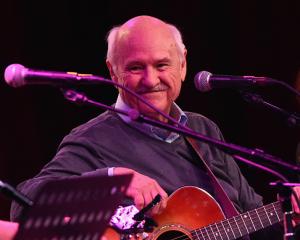Howe Gelb describes his Giant Sand incarnation as a "mood". Exactly what sort of mood New Zealand audiences might expect when the Tucson, Arizona, songwriter arrives here next week remains to be seen (or heard).
Gelb has been relaxing at home with his young family, having just finished a tour of the West Coast of the United States.
He has just a week to unwind before packing his bags for a solo visit to New Zealand then Australia, including a gig at Sammy's, Dunedin, on Thursday, October 23.
With a back-catalogue spanning three decades and comprising no fewer than 40 albums as both a band leader or solo artist, Gelb will have no shortage of material from which to pick.
He prefers to go without a set list, instead dipping into what he terms the emotional energy of the night. Every place, every crowd is different, so why offer all the same fare?
"A night on tour is just a dip in the water, a dip in that current. You ride it for a little bit and that's all you can do," Gelb explains via phone earlier this week as an autumn day turns to night in Tucson.
The British press has described Gelb as the godfather of alt-country, acknowledging an influence that has spread like the roots of some strange desert weed to others who exist on the more experimental edges of country music.
Yet, don't fence him in, he appeals.
"It sounds kind of prestigious on one hand, but worthless on another. And limiting. I don't know. I figured to stay out of that one a long time ago. People make up reasons for other people doing things, like they are trying to place things I guess.
"If I were to come up with my own description . . ."
Gelb pauses.
He mentions the Brits' penchant for putting people in boxes, though you get the feeling he's describing most media.
"I think I'm more or less the ambassador of 'erosion rock'."
Gelb's prolific output ranges from dusty, southwestern country-roots, the Americana strains of Bob Dylan cohorts The Band, and beyond to lo-fi punk and even jazzy strains.
The erosion to which he refers is an improvisational attitude that has served him well over the years, be it in the guise of Giant Sand, under his own moniker or that of other projects such as the Band of Blacky Ranchette.
"I think improvisation is a form of problem-solving . . . You do the things that you think are necessary to inspire yourself and then that fires the ignition to keep you excited and awake at the wheel for long excursions.
"I just go by my gut, my instinct and work with what I have. For some reason there is a churning that bubbles up from the surface and I need to do something with these things that, for no better definition, I'll call songs - or at least near-songs."
Gelb likes space in his music; he believes minimalism allows listeners' brains to fill in the gaps; he has no time for clutter, both in his songs and his life.
It's why he lives in the desert.
"If you are lucky enough to find a place that represents how you think, that correlates the elements . . . that's the excuse for me being out here. I was delivered here by fatalistic means," he says, referring to a 1972 flood in Pennsylvania that flushed him downstream to Arizona where he had to contend with the emotional flotsam of his parents' divorce.
Soon after arriving in Tucson, Gelb met guitarist Rainer Ptacek (who died of cancer in 1997) and the pair went on to form the Giant Sandworms, later to become Giant Sand.
The band spawned other acts such as The Friends of Dean Martinez, OP8, and the commercially and critically successful Calexico, featuring former Giant Sand rhythm section John Convertino and Joey Burns.
Gelb describes Giant Sand as a "guerrilla-tactical small band unit".
Usually comprising drums, bass and a guitar or two, it is small enough to be affordable in a touring sense, but allows him a "big enough" sound.
He enjoys the different sensibilities his various line-ups bring. Take, for instance, the nine-strong Canadian choir he employed for 2006 album 'Sno Angel Like You.
"My voice is more like a map discerning where a singing voice would be, but I had nine people who, together, issued these overtones that were dizzying. But that's a big thing: the choir is like a small town to travel with.
"Then I can go it alone, of course and then you are a phantom. You're not really there.
"All these things seem to come in and out of their own seasons. I've got this noise record which I did with this Viennese band a few years ago - that could have very well happened instead of the gospel thing.
"I've got one I've almost done with these flamenco gypsy guitarists from Spain, but I don't know if that will ever see the light of day either.
"I don't worry about if these things are ever going to get released; I just find myself involved. The release schedule is a whole other animal."
The latest incarnation of Giant Sand, that which features on new album Provisions, comprises Gelb, Danish musicians Thoger T. Lund (bass), Peter Dombernowsky (drums) and Anders Pedersen (slide guitar).
It also includes talented friends Neko Case, M. Ward and Isobell Campbell.
Provisions, released last month, continues Giant Sand's "desert-noir" approach.
It is cinematic, big yet empty.
You get the feeling offbeat director David Lynch might like to use some of the material in a road film such is the sense of movement and unease, both in Gelb's lyrics and structures.
Provisions deals with a range of subjects, from the personal to the political.
One of its centrepieces is Spiral, with its references of "purple hearts that will never mend" and an "end time" suggesting all is not well with the world.
However, Gelb is not about to explain his lyricism.
"I would be making the wrong move to tell you what it's about. Once it's out of my hands . . . I'm just trying to be a decent craftsman at what I do.
"I can't fully articulate or explain what it is. I haven't made it easy and I apologise. I just want to do what I think is good and hand it over."
Gelb, who will turn 52 while he's in New Zealand, was recently bestowed a "Local Genius Award" from a museum and arts group in recognition of his contribution to the Tucson music scene.
He seems genuinely stunned when the issue is raised.
"How did you hear that?" he asks, then pauses.
Gelb's reaction to the award is not unlike his songs: oblique.
"I'd rather just take responsibility for things going horribly wrong than take any kind of credit or award because that's when you're setting yourself up for a fall.
"All I know is I was working on a soundtrack for a cartoon movie about Mars. The phone rings and this woman is trying to tell me about this local genius award and that I was in good company as the other guy who was on there was a Mars scientist who was also from Tucson.
"I'm listening to this woman's voice on the phone and looking at the cartoon on my screen and somehow I was connecting the dots.
"It was beyond me, but there it was."














